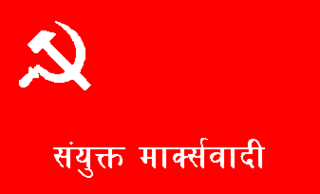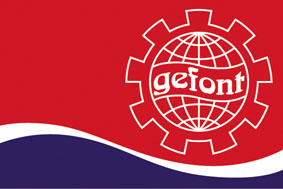
The Communist Party of Nepal, abbreviated CPN, was a communist party in Nepal from 1949 to 1962. It was founded on 15 September 1949 to struggle against the autocratic Rana regime, feudalism, and imperialism. The founding general secretary was Pushpa Lal Shrestha. Other members were Nar Bahadur Karmacharya, Niranjan Govinda Baidhya, and Narayan Bilas Joshi.

The Communist Party of Nepal , abbreviated CPN (UML), is the major communist party in Nepal since its formation in January 1991, merging the Communist Party of Nepal (Marxist) and the Communist Party of Nepal (Marxist–Leninist). It is the main opposition party in the Federal Parliament of Nepal. It remains the main rival of governing Nepali Congress.

The Communist Party of Nepal , abbreviated CPN (UC–M) was an underground communist party in Nepal. The CPN (UC–M) was formed in 2002 through the merger of Communist Party of Nepal and Communist Party of Nepal (Masal).

The Communist Party of Nepal (Marxist) was a Nepalese political party. It was formed on 1 November 1991 by a group of former leaders of the original Communist Party of Nepal (Marxist) that had been expelled from the Communist Party of Nepal. Initially, it was known as the Communist Party of Nepal but took the name Communist Party of Nepal (Marxist) after approximately one year of existence. Prabhunaryan Chaudhary was the chairman of the party.

Communist Party of Nepal (Democratic) was a splinter group of the Communist Party of Nepal (Rayamajhi) formed in 1979, in the backdrop of the popular movement that surged in that year. The party was led by Bishnu Bahadur Manandhar.

The Communist Party of Nepal was a communist party in Nepal 1974-1990. It was the major communist group in Nepal during the latter part of the 1970s, but gradually lost influence due to internal disputes. The party actively participated in the struggle for democracy in 1990, and its leader took part in writing the Nepalese Constitution. It later merged with other forces to form the Communist Party of Nepal, out of which the Communist Party of Nepal (Maoist) emerged.

The Communist Party of Nepal, also referred to as the Communist Party of Nepal (Amatya), was a communist party in Nepal. It emerged from a split in the original Communist Party of Nepal (CPN) in 1962. The CPN had been ravaged by internal conflicts due to the Sino-Soviet split and differences of how to relate to political changes in the country.

The Communist Party of Nepal (Marxist) was a political party in Nepal. It was formed through the merger of the Communist Party of Nepal (Manmohan) led by Man Mohan Adhikari and the Communist Party of Nepal led by Sahana Pradhan in 1987. The Nepal Trade Union Centre was the trade union of CPN (Marxist) and Nepal Progressive Students Union was their students' union.

The Communist Party of Nepal (Marxist–Leninist) was a political party in Nepal. It was launched in 1978 by the All Nepal Communist Revolutionary Coordination Committee (Marxist–Leninist), which founded by groups involved in the Jhapa movement. The CPN (ML) published Varg-Sangarsh and Mukti Morcha.

Communist Party of Nepal (Burma), initially known simply as Communist Party of Nepal or Communist Party of Nepal , was a communist party in Nepal. The party emerged from a split in the original Communist Party of Nepal in 1962, representing the pro-Soviet sector of the party. Its main leader until 1983 was Keshar Jung Rayamajhi, who had been the general secretary of the original CPN.

The Communist Party of Nepal was a political party in Nepal existing from 2005 until 2013.

Mohan Bikram Singh, often referred to as MBS, party name Gharti, is a Nepalese communist politician. His father was a wealthy landlord in Pyuthan District who was close to King Tribhuvan. MBS however joined the opposition Nepali Congress in 1950, and took part in the 1950–1951 uprising for democracy.

Communist Party of Nepal was a communist party in Nepal. It was formed on November 15, 2005 through the merger of the Communist Party of Nepal (Marxist-Leninist-Maoist) and the Nepal Samyabadi Party (Marksbadi-Leninbadi-Maobadi). The party was led by Krishna Das Shrestra (chairman) and Nanda Kumar Prasai.
Nepal Progressive Trade Union Federation is a central trade union federation in Nepal. It is the labour wing of the Communist Party of Nepal. NPTUF was formed on November 19, 2005, through the unification of the Nepal Trade Union Federation and Nepal Trade Union Centre. NPTUF is a constituent of the United Trade Union Movement Coordination Committee.

The United Left Front was an alliance of communist parties that opposed the autocratic regime in Nepal. It was formed in 1990 and conducted joint movement with the Nepali Congress. The uprising, called Jana Andolan, brought to an end of monarchic dictatorship and led the way for multiparty elections.

The General Federation of Nepalese Trade Unions (GEFONT) is a confederation of 20 national trade union federations. It is politically tied to the Communist Party of Nepal. GEFONT declares its goal to be "Socialism for the dignified working-class and prosperous life".

The All Nepal National Free Students' Union is a political student organization in Nepal. The ANNFSU was founded in 1965. The original ANNFSU was later divided along ideological lines, and there are several organizations that emerged from it. The main ANNFSU grouping today is politically tied to the CPN (UML). As well as declaring itself a legitimate and independent students' organization of all progressive, democratic and patriotic students of Nepal, the mainstream ANNFSU is currently a member of the World Federation of Democratic Youth.

The Nepal Communist Party, abbreviated NCP was founded on 17 May 2018, from the unification of two leftist parties, Communist Party of Nepal and Communist Party of Nepal. The unification was completed by the Party Unification Coordination Committee, after eight months of negotiation. The two predecessor parties subsequently dissolved, making way for the new united party. The party retained the electoral symbol of the CPN, the sun.

Keshar Jung Rayamajhi was a Nepalese politician. He was a leading figure in the communist movement in the country, but later turned into a royalist. Rayamajhi hails from a landlord Chhetri family in Tansen, Palpa district.

The Communist Party of Nepal , abbreviated as CPN is the fourth largest political party in Nepal. The party was officially registered by the Election Commission, Nepal on 18 August 2021, after it split from the largest communist party in Nepal, the CPN (UML). Former Prime Minister Madhav Kumar Nepal is the Chairman of the new party and Former Prime Minister Jhala Nath Khanal serves as the Senior Leader.








